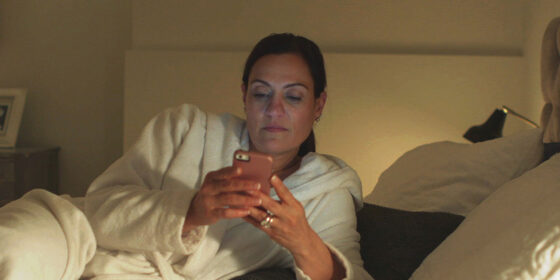Les Salopes, or The Naturally Wanton Pleasure of Skin (Renée Beaulieu, Canada) — Contemporary World Cinema
By Angelo Muredda
What can be said about Renée Beaulieu’s Les Salopes, or The Naturally Wanton Pleasure of Skin that isn’t already conveyed in the title? The Québécois filmmaker and University of Montréal film professor’s second feature—which concers a biologist whose research on the potentially scandalous connection between desire and dermatology—sits at an awkward juncture between a position paper and the kind of austere erotic drama Canadians of a certain age might remember catching late at night on the Showcase Revue back in the ’90s. The film is steeped in artful, slow-motion interludes that purport to capture the ecstasy of the protagonist’s sexual liberation—from what, beyond a comfortable upper-middle-class existence and a boring husband, it’s hard to say—and canned intellectual debates over wine and tasteful décor about the nature of sex, power, and gender that wouldn’t be out of place in a Denys Arcand movie.
In that mix of academic hypothesis and extracurricular exploration, the film feels like a grey B-side to Claire Denis’s Un beau soleil interieur, a high-minded Roland Barthes adaptation that benefited from the filmmaker’s quintessential tactility, curiosity, and warmth, qualities conspicuously lacking here. In Beaulieu’s defence, she’s clearly after something frostier, in concert with Brigitte Poupart’s flinty lead performance as Marie-Claire, she of the eponymous naturally wanton pleasure. There’s an impressive synchronicity between the desaturated cinematography and bone-dry mise en scène and Marie-Claire’s compulsiveness in indulging all her sexual whims.
Yet what a bore those whims turn out to be. Even putting aside the silliness of the conceit that there is something edgy about studying what desire does to your skin (as with most academic subjects, and as Beaulieu herself surely knows, there’s probably a conference for that), or blurring the lines between horny research and horny living, Poupart doesn’t have much to play here besides frankness and, later and less convincingly, regret at how her decision to live by the sword of her own libido might have affected her daughter. That’s as moralistic a development as a separate subplot about how the #MeToo moment turns women and students into spineless victims is nasty. And that’s to say nothing of the unselfconscious way in which Marie-Claire’s romantic pursuit of a black graduate student (who writes erotic poetry that makes her gasp in the bathtub) is passed off as one woman’s private dalliance rather than racial fetishization and professional exploitation. Mostly, it’s a shame that, despite the provocative title, the stakes feel so low, the conclusions reached before any data has been gathered.
Angelo Muredda
- « Previous
- 1
- 2



